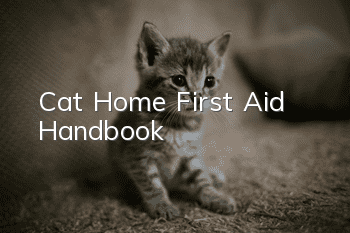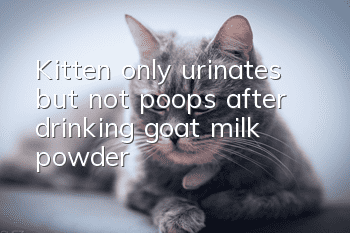Cat Home First Aid Handbook

Parents who raise cats all have one thought, that is, the health of the cat is the most important. Many parents who raise cats do not have a 24-hour pet hospital nearby. If the cat has an emergency situation of illness and cannot seek medical treatment in time, this will The owner needs to know some first aid knowledge in daily life, just in case.
1. Influenza
1. Influenza is a viral disease that is usually spread by contact between cats. Antibiotics have no effect on viruses, so the usual treatment method is to reduce the cat’s clinical symptoms as much as possible and improve the cat’s own resistance through nutritionally balanced food to protect the cat’s life until the cat recovers naturally. But there is a way to prevent it - vaccination, which can deal with the flu.
2. Cats suffering from this disease show symptoms of a severe cold, and may also have ulcers on the surface of the eyes or inside the mouth. Cats rely on their sense of smell to arouse their appetite. Influenza can cause a loss of smell, resulting in a reduction in the cat’s food intake. Some cats never recover and become chronic flu sufferers or "snuffies." Kittens are often the worst victims and will die without careful care. To help protect against this disease, kittens need to be vaccinated, and adult cats need an annual booster shot.
2. Enteritis
This disease is very dangerous, especially for young cats. Symptoms of this disease include lethargy, loss of appetite, vomiting, dehydration and diarrhea. If a female cat is infected with this disease during pregnancy, her kittens will have symptoms of neurological damage. Enteritis viruses can persist for up to a year under certain circumstances. Like the flu. Cats that recover can become carriers of enteritis virus. In addition, kittens need to be vaccinated against enteritis as required by a professional doctor, while adult cats need to receive a booster shot once a year.
3. Parasites
1. Prevention: Fleas and lice are two of the more common parasites in cats. They are usually infected through an unclean living environment or contact with other small animals infected with fleas. Once infected, it will cause other types of diseases and cause serious consequences. To prevent it, always bathe the cat with a suitable shampoo to get good results. At the same time, it also keeps the cat’s living environment clean and hygienic.
2. Deworming: If you find lice on your cat, but the cat has no obvious symptoms, you should remove the lice and closely observe the cat’s behavior in the next few days. If symptoms such as coughing, vomiting, abnormal voice, or abnormal gait occur, the cat should be taken to the hospital immediately.
4. Poisoning
Symptoms of poisoning include sudden vomiting or diarrhea, excessive salivation,Trembling, convulsions, unsteadiness, and sudden falls. Any time poisoning is suspected, immediate attention should be given. If you can get your veterinarian to look at suspect items such as food packaging, labels, food, vomit, or snakes or spiders that were killed after biting your cat, this will help with the diagnosis. Provides great help.
- Why do cats eat grass?
- Can cats eat mangoes?
- How does a kitten spend a day?
- Cat food allergy symptoms
- What should I do if my cat’s nails bleed after cutting them?
- What should I do if my kitten clings to the bed?
- What to do about cat skin diseases_Common symptoms of cat skin diseases
- What kind of cat food does Siamese cats eat? Siamese cat feeding guide
- Introduction to the physical characteristics of Somali cats
- Is Selkirk Rex cat easy to raise? Selkirk Rex cat maintenance knowledge



